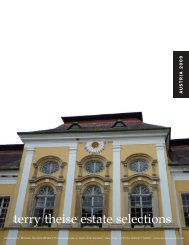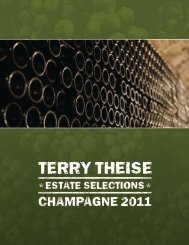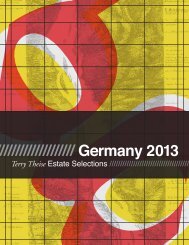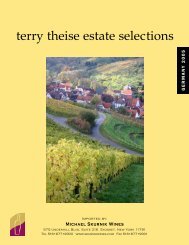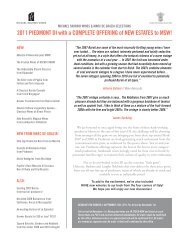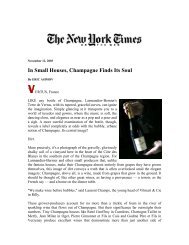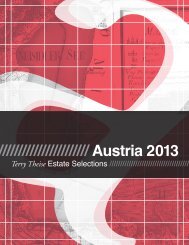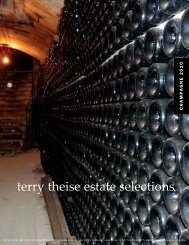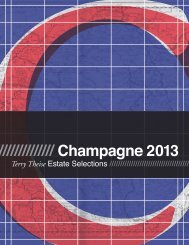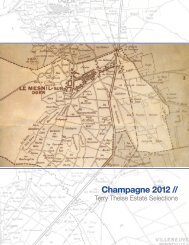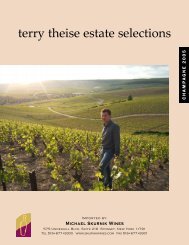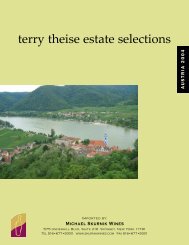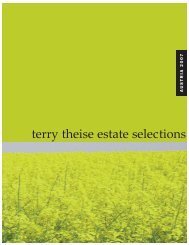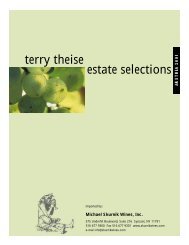German Catalog 2006 USE THIS ONE.qxp - Michael Skurnik Wines
German Catalog 2006 USE THIS ONE.qxp - Michael Skurnik Wines
German Catalog 2006 USE THIS ONE.qxp - Michael Skurnik Wines
You also want an ePaper? Increase the reach of your titles
YUMPU automatically turns print PDFs into web optimized ePapers that Google loves.
RHEINGAU WINES<br />
142<br />
josef leitz<br />
rheingau • rüdesheim<br />
I think Johannes Leitz should grow a beard or something, so he can start looking his age. I first<br />
met him as a “big baby” of about 25 and now he’s a man of 40. A big baby of 40!<br />
He’s also up to a whopping 26 hectares, in large part in order to supply us with enough<br />
“Dragonstone,” but also because success accrues to success and good growers often find access<br />
to good land. Johannes has secured parcels in two fascinating sites hovering just above<br />
Rüdesheim, which he will see through an entire cycle this year. The first wine, a Kabinett, was<br />
a promising maiden-voyage, somewhat Geisenheimer Rothenberg in style, with lovely fragrance.<br />
Look for “Rüdesheimer Rosengarten” in future offerings.<br />
Some of you know Johannes better than even I do; he visits us regularly and makes friends<br />
wherever he goes.<br />
And parties wherever he goes . . . . Yet I must say I<br />
like best of all to see him there, at home, lord-of-themanor,<br />
because being an international-wine-guy can<br />
obscure some of what gets you there — any clod can<br />
climb on a plane — and what got Johannes Leitz there<br />
was connectedness to his land and honesty in his winery.<br />
A Rheingauer making wines this stellar could easily<br />
ask double these prices. Could drib-and-drab them out in<br />
crumbs to make them seem more precious. Could sit in<br />
his ivory tower waiting for the world to beat a path to his<br />
door. My friend Johannes has the biggest heart I think I<br />
have ever seen. He supplies me as a friend and encourages<br />
a companionable partnership to which every other<br />
business relationship should aspire.<br />
When I made my first approach to Johennes Leitz<br />
(15 years ago!) I found a sober young man still not out of<br />
his twenties, running a 5.8 hectare estate. His father had<br />
passed away when Johannes was a year old, and his<br />
mother resolutely maintained the winery until Johannes<br />
was old enough to hand it over to. He accelerated his<br />
studies by doing the basic courses at Eltville rather than<br />
the grand chi-chi at Geisenheim. He got home in the nick<br />
of time. The winery had survived, but barely. And it was<br />
frozen in time 18 years earlier. Johannes would need to<br />
Johannes Leitz<br />
•Vineyard area: 26 hectares<br />
•Annual production: 10,000 cases<br />
•Top sites: Rüdesheimer Berg Schlossberg,<br />
Berg Roseneck, Berg Rottland and Berg<br />
Kaisersteinfels<br />
•Soil types: Weathered gray and red slates,<br />
sandy loam and loess, chalk and quarzite<br />
•Grape varieties: 100% Riesling<br />
invest, soon, a lot. Johannes was determined to make<br />
great wine.<br />
He’s a man with a passion for aroma. “I almost prefer<br />
inhaling to actual tasting,” he says. “I can’t really love<br />
a wine regardless of how it tastes if it doesn’t excite me<br />
on the nose. I want my own wines to seem more fragrant<br />
than the norm, fruitier and more harmonious. They<br />
should simply be better!” Leitz insists that “Wine grows in<br />
the vineyard; it isn’t made in the cellar. There’s no question<br />
that different soils give different flavors. Anyone<br />
who tastes a Berg Schlossberg, with its high proportion<br />
of slate, alongside a Bischofsberg, will taste the importance<br />
of soil in a hurry!”<br />
“I work very clean,” he says, echoing the one refrain<br />
you hear in every good estate. “My friends call me finicky<br />
about cleanliness,” he continues. “I also try to disturb the<br />
wine as little as possible, pumping for instance.” On the<br />
subject of Trocken wine, Johannes can speak with authority,<br />
having earned the right by making many of the greatest<br />
dry <strong>German</strong> wines I have ever tasted. “I’m of the opinion<br />
that during the dry wave a lot of wines were made dry<br />
that weren’t in any way suited for dry wine. You really<br />
need a certain kind of base wine to make a good Trocken.<br />
If you’re honest about it, there’s probably no more than,<br />
say, thirty percent of any cellar that fits. The rest would be<br />
better with a few grams or more of sweetness.” He also



